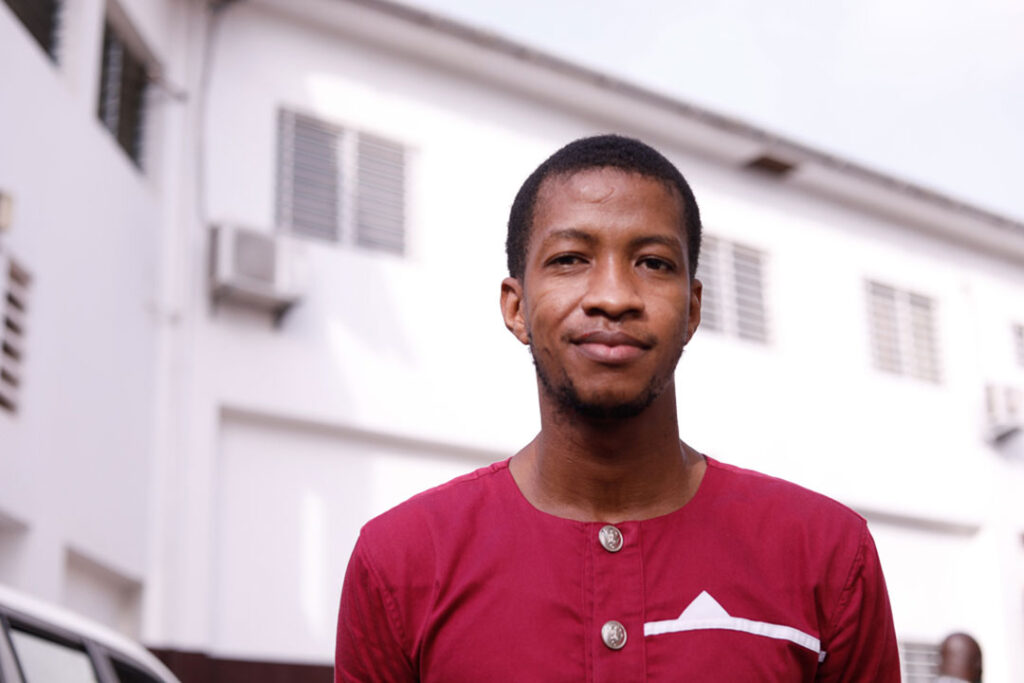ADF STAFF
Dr. Mamadu Baldeh fought COVID-19 one patient at a time in Sierra Leone.
Four years out of medical school, the 32-year-old was the only doctor treating COVID-19 patients when the disease first appeared in the country in March. That meant he often slept at Connaught Hospital in Freetown.
Since then, Connaught’s COVID-19 staff has grown to four doctors and 20 nurses, but they still struggle to keep up with the demand their patients put on the country’s fragile health system even as, he told ADF, the cases have begun to decline.
Baldeh, who left the hospital temporarily at the beginning of October to pursue a master’s degree, said the staff members work to keep a positive outlook as their patients struggle.
“That’s what all my colleagues are doing,” Baldeh told interviewer Vickie Remoe during her internet program The Local Response. “You have to be optimistic. That’s the best thing you have — to keep on pushing.”
Connaught’s COVID-19 isolation ward is a long way from Baldeh’s first experience as a doctor: Straight out of medical school, he volunteered as a medic for the 2016 Olympic Games in Rio de Janeiro, Brazil. Baldeh grew up in Sierra Leone and spent his childhood in Scouting, which prepared him for public service, he told the United Nations’ Africa Renewalmagazine.
“As a child I envisaged a career of service: taking care of people in pain and discomfort. I, therefore, decided to become a doctor,” he said.
Sierra Leone was one of the last countries in Africa to report COVID-19 infection. Having recently come through the 2014-2016 West African Ebola epidemic, the country’s leadership pushed protective measures such as masks, social distancing and hygiene to keep infections at bay as long as possible.
“In the early days of the fight against COVID-19, it seemed we were ahead of the virus,” Baldeh said.
By early October, Sierra Leone had reported fewer than 2,300 cases of COVID-19 and 72 deaths across a population of 7.6 million people. So far, it remains among the least-affected countries on the continent. But that still has been enough to overwhelm the health care system.
Connaught Hospital is Sierra Leone’s hospital of last resort, but it has only 12 isolation beds dedicated to COVID-19 patients. It receives the sickest patients in the late stages of the disease, often transferred from smaller hospitals.
Early on, the hospital lacked the resources to keep up with the rush of patients.
“The challenge comes in where we may have just one thermometer, or one BP machine or two pulse oximeters,” Baldeh told The Local Response. “Or we have a patient who comes in with no money, and we write a prescription. They can’t get the drugs because they don’t have money. So, we have to outsource somewhere. Thanks to God, we have some good people.”
Since the outbreak began, Baldeh has received donations of key equipment that means he now has 12 fully stocked isolation beds. He no longer worries as much about accidentally transmitting the virus from one bed to the next. But each stop still requires a visit to the personal protective equipment room for a time-consuming change of masks, gowns and other gear.
Then there’s the memorizing: To avoid cross-contamination, he leaves pens, pads and any other object that might transmit COVID-19 outside the isolation unit. That means committing each patient’s vital signs to memory before leaving the unit to write them down.
Baldeh leads Sierra Leone’s Junior Doctors Association in a country where three-quarters of the medical professionals are under 35. In his role, he often gets called upon to speak on talk shows like Remoe’s to spread the word about COVID-19, dispel rumors and provide reliable advice.
“The communication aspect in this fight has some gaps that need attention if we’re going to get people the right information,” Baldeh told Remoe. “If you begin giving conflicting information, you are just confirming the fears.”

